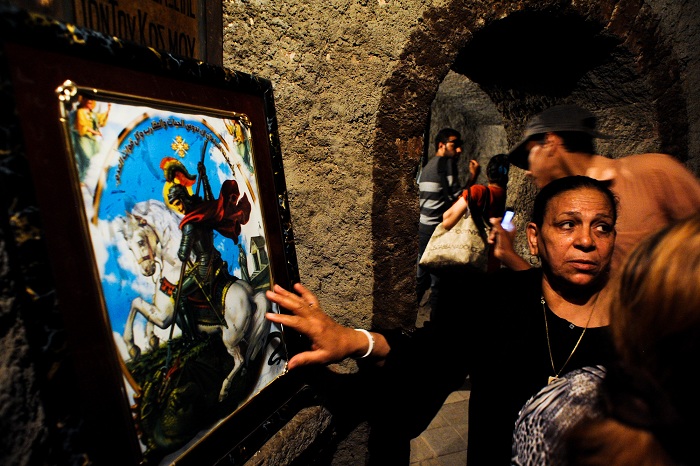
Laurence Underhill
On 31 October 1971, scores packed into St. Mark’s Cathedral in Alexandria looked on as a small child named Ayman Ghali, blindfolded and held by a deacon, selected one of three names at the altar.
He handed it to Metropolitan Antonious, the locum tenens (acting head of the Church) who then held up the name of who would become the 117th Pope of the Coptic Orthodox Church. The name was Bishop Shenouda, Bishop of Christian Education and the Dean of the Coptic Orthodox Theological Seminary, a popular member of the clergy after who was known and respected within the Church for his theological work and support of reforms.
The selection profoundly affected the next 40 years of the Coptic Church, and Egypt as a whole. The difference in Egypt’s oldest institution between his ordination on 14 November of that year and his death on 17 March 2012 is vast.
On November 4, the Church will select Shenouda’s successor, a figure who will guide the Coptic population through a period of instability and the threat of increased sectarian tension. While some are hoping the Pope will take a reduced public role, others expect him to champion Copts political rights. Daily News Egypt explores the candidates for this almost 2,000 year-old position and what will be expected of him.
Powers of the Pope
The new Pope will head the church’s highest authority, the Holy Synod, making crucial decisions matter of faith, such as divorce and on structure, such as the selection of high ranking clergy.
He will also be chairman and Supreme Judge of the Church’s Ecclesiastical Court, ruling on disputes over church law and other controversial internal affairs. He is also responsible for canonizing saints, checked by the members of the Holy Synod.
An increasingly important role of the Pope is his duty in consecrating churches and dioceses. Pope Shenouda’s 40 year tenure saw a rapid expansion of Coptic communities overseas, and he was responsible for consecrating hundreds of new churches throughout North America, Europe, Australia, and Africa.
The Pope is additionally responsible for the ordination of bishops and metropolitans.
Eligible candidates for the papal seat must be members of the church 40 years or older, celibate, and have had at least 15 years of monastic life.
The Process
Despite the Coptic Church’s pride in traditions that have remained intact for centuries, the process for selecting a leader has evolved throughout the course of its history, sometimes at an inconsistent rate.
According to Church tradition, the church of Egypt’s first patriarch was Saint Mark the Evangelist, author of one of the four gospels and one of Jesus Christ’s original 70 apostles. The apostle was the first to spread Christianity to Africa, and oversaw his ministry from Alexandria before he was killed by the Romans.
In its early history, the head of the Church was the only bishop in Egypt and twelve priests, based in Alexandria, would agree on a successor among themselves when their leader had died. The appointment of a pope was occasionally influenced by his predecessor, who in a number of cases expressed favour for a successor when on his deathbed.
As the Church grew, various bishops overseeing different areas of the country, began contributing to the process of selection by consensus. However, the 12 priests of Alexandria maintained strong influence over the selection process, and their role slowly diminished over time.
The casting of lots was used occasionally during the Church’s early periods when a consensus could not be reached.
A share of Popes was chosen unconventionally under claimed “divine inspiration.” The most popular example is mentioned to have occurred in the 200s in the Synaxarium, a historical collection of the Church’s saints. The account claims that the ailing Pope Julian had a vision in which he was told that his successor would visit him the next day with a cluster of grapes, which were out of season at that time of year.
The next day, a farmer named Demetrius found grapes and went to the Pope for his blessing, and shortly after became Pope Demetrius I, the twelfth bishop of Alexandria. Throughout most of its history the Coptic Church traditionally selected monks and deacons as Pope. In 1873, the Holy Synod prohibited selection of bishops to occupy the papal throne, maintaining that bishops could only oversee papal affairs during an interim period while the deceased pope’s successor was being chosen.
The current method used was put forth in 1957 and approved as a presidential act. The process is currently going through its third implementation and was used to select Pope Cyril VI and Pope Shenouda III. Candidates are approved if supported by a minimum of six members of the Holy Synod or twelve members of Maglis Al-Milli(General Congregation Council). Maglis Al-Milli represents the laity of the Church and deals with non-ecclesiastical matters of the community. Following the initial nominations, an elections committee considers the qualifications of each candidate and examines appeals lodged against them. The committee then privately systematically eliminates candidates until between five and seven remain.
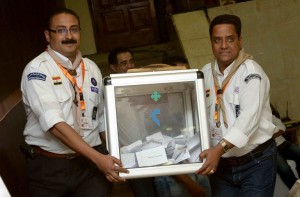
Mohamed Omar
The list is reduced to three candidates by voters chosen among the Church’s clergy, prominent Copts, including journalists and politicians, and lay members across dioceses around the globe. The number of voters increased to 2,417 this year to accommodate the growing number of overseas dioceses. Those overseas can either travel to Cairo to cast their ballots, or obtain a letter of power of attorney that allows for someone to submit their ballots for them.
The selection by each voter is made by crossing out names of candidates that the individual rejects, and can only leave a maximum of three names that are not crossed out. If a voter wants to support a single candidate, he or she must cross out all names on the ballot except for the candidate he or she favours.
On 4 November, the altar ballot will take place at St. Mark’s Cathedral in Abbaseya. According to Church law, the lot is drawn by a blindfolded child so that God has a final say in the selection. The process also does away with the internal politics and lobbying that may occur in previous stages of the selection.
Bishop Pachomious will then reveal the name of the next pope to the congregation, also showing the other names in the box for transparency.
The Church will then ordain the selected nominee on 18 November in a ceremony that will be attended by members of the clergy, high ranking government officials including President Mohamed Morsy, foreign dignitaries, and officials from other religious orders.
Controversy
Saint Mark’s long list of successors come from backgrounds as diverse as the processes used to select them. Among those who occupied the papal throne were monks, laymen, deacons, and other lower ranking members of the Church’s clergy. For most of the Coptic Church’s history, bishops were barred from becoming Pope.
The Coptic Pope is technically also the Metropolitan of Alexandria, and traditional canon law prohibited the transfer of a bishop or metropolitan from one diocese to another, with the exception of a very narrow set of circumstances.
However in 1928, Bishop Youannes of Beheira was selected and ordained as Pope Youannes XIX. Many prominent figures within the Church claim that the decision was hastily made under exceptional political circumstances and with complete disregard to ecclesiastical law.
Bishop Serapion of Southern California and Hawaii claimed in a report issued by his diocese that Youannes appointment as Pope came as a result of his wide range of experience as bishop, his performance as locum tenens after the death of his predecessor Pope Cyril V, and pressure from King Fouad.
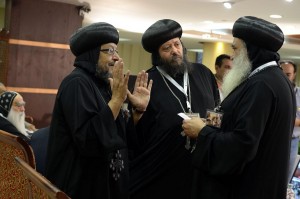
Mohamed Omar
Youannes was elected Pope by 85 bishops, abbots, and members of the Lay Council. This set a precedent that was used to elect Popes Macarius III and Yusab I in 1944 and 1946 respectively.
However an article in the 1957 election law permitted bishops from other dioceses to be selected for the papal throne. This aspect of the law has been disputed. On one side, some members of the community claim that it defies Church tradition while others welcome the development. Bishops Raphael and Tawadros are both general bishops, and therefore assist the bishops in supervising their dioceses, rather than having direct jurisdiction over them.
The selection of Pope Shenouda III was seen as less controversial, as he was Bishop of Christian Education and had not been assigned a specific diocese from which he had to be moved from to become Bishop of Alexandria. His predecessor Pope Cyril VI was a monk prior to his selection.
Many members of the Coptic Church have called for reforming the 1957 Law, both to restrict bishops’ nominations, which some argue opens the door to more inner politics within the church, and to open voting to a much higher number of participants.
A less political pope?
A line of framed photos lines the hall leading to the Virgin Mary’s Church in Coptic Cairo. More commonly known as the “Hanging Church,” the historical landmark has stood since the seventh century, and was served as the seat of the Coptic Pope when it was first moved from Alexandria to Cairo in 1047. The chronologically arranged photos show leaders of the Church with Egyptian heads of state, starting with Pope Macarius II and King Farouk and ending with Metropolitan Pachomious, the current caretaker of the Church, with President Mohamed Morsy.
“The Church is only a spiritual authority.” This sentence was uttered by Mina Danial in a television interview. It came in response to the host asking why he had continued protesting after Shenouda urged Copts to refrain from doing so. Danial was killed in the Maspero massacre on 9 October 2011 when the Egyptian Army attacked predominantly Christian protesters demonstrating against the destruction of a Church.
Since then, his likeness has been emblazoned on the walls of Cairo streets as his name echoes from anti-government sit-ins as a posthumous representative for not only Copts, but all those who suffered before, during, and after Egypt’s revolution.
He also represents the evolution of a community that had been relatively politically withdrawn during the days of Nasser, Sadat, and Mubarak. The increased level of participation is seen in the Cairo neighbourhood of Shubra, where a group of senior members of the Maspero Youth Union (MYU) huddled around a table on a Thursday night discussing ways to effectively campaign against the current draft constitution.
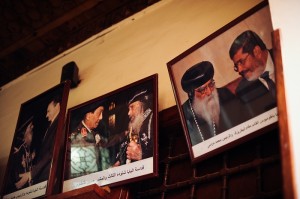
Laurence Underhill
The MYU was formed after a protest on 5 March 2011 when demonstrators marched to the state radio and television building in the aftermath of the torching of Saint Mina and Saint George’s church in the village of Soul. The group claimed that day they realised that it needed to form a group to raise awareness of sectarian issues throughout Egypt and to provide a voice independent of the Church that could pressure the government to act against the attacks on Christians that had increased in rate since 25 January.
When discussing the political role of the Church, many politically active Christians hope for and foresee a more withdrawn role from the papacy, replaced by groups like MYU along with progressive and leftist parties.
“There’s a dangerous school of thought in the Church that we should always turn the other cheek,” said Mina Al-Qess, a spokesman for the MYU’s political committee. “People need to understand that now we have to fight for our rights. When you’re sick do you just stay at home and pray? No. You go visit a doctor,” he said.
Al-Qess stressed that one of the most important priorities in post-revolution Egypt is making Copts feel like full citizens.
Hany Ramsis, another MYU member, said that the role of the Pope is clearly stated in Church law and tradition and that it was a role that the next pope would need to observe.
“Parties and the government need to stop talking to the Church as if they’re speaking to us,” said Androis Eida.”We know the issues we face on the ground every day more than the Church. And when the Church talks about a sectarian issue, we can’t contradict it.”
“Let the Church deal with its own internal dealings, not our roles as citizens,” added Ramy Kamel.
While many Coptic youth were critical of some of Shenouda’s decisions, especially political ones, many respectfully remember the personable former patriarch who was notoriously accessible to members of the Church. “I remember seeing him at local parishes overseeing ceremonies that bishops should have been responsible for,” said Bishoy Tamry. “He managed to do it, but the next one won’t and the bishops will have to get used to it.”
However not all politically active Copts agree on a politically silenced papacy. “We hope that [the Pope] will take steps back [from politics], but I think the policies of Morsy and Salafi attacks will not allow for the next pope to do that,” said Emad Gad, a political analyst for Al-Ahram Centre for Strategic Studies and former MP of the Egyptian Social Democratic Party who participated in Monday’s papal elections. “I think he will be forced to play a political role,” he added.
Gad pointed out examples of ways in which the current political climate acted on a sectarian basis, including Article 3 of the current draft constitution which says that Christians are subject to their own religious laws for personal issues. He blamed the sectarian mentality on the current wave of political Islamism from the Muslim Brotherhood and Salafi groups.
It was these external problems that Gad deemed most critical for the next pope to deal with. “I think the hottest issues are outside the Church,” he said. “…to deal with the president, the government, and how to get the rights of Christians as Egyptians, not as a minority. As Egyptians, we are asking for total citizenship and equality. We are not just asking for some interests as Christians.”
And then there were three
The final three candidates are two bishops and a monk, and won by a large margin over the other two candidates in the elections phase on 29 October.
Bishop Raphael, General Bishop of Downtown Cairo- Bishop Raphael was born Michel Erian Al-Hakim on 10 March 1958 in the Cairo neighbourhood of Shubra. He entered the Ain Shams University Faculty of Medicine in 1974 and practiced as a physician for a few years before receiving his clerical degree in 1984. He was ordained a monk in 1990 at the Baramus Monastery in Wadi Al-Natroun as Father Justus Al-Baramusi. He was ordained Bishop of the Downtown Cairo churches in 1997 by Pope Shenouda III. Bishop Raphael’s sermons were well known, as was his emphasis on education and youth outreach. He has also been the author of many books during his tenure as bishop.
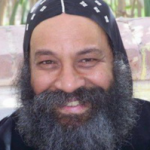
Basil El-Dabh
He also utilised his background in medicine to help establish medical centres in downtown Cairo and took advantage of the diversity of his diocese to foster good relations with the other Christian communities in his area.
Raphael takes on a more proactive philosophy when it comes to the Church’s political role. According to a biography provided by the Church, the Bishop of Downtown Cairo lobbied Prime Minister Essam Sharaf’s government for the ease of restrictions on the building of churches in response to the wave of ongoing sectarian conflicts that surrounded this issue.
Because of the central nature of his post and his success, Raphael is the most well known of the remaining three candidates and is close with Bishop Moussa, general bishop of Youth Affairs and one of the most widely popular members of the Coptic clergy. He received the most votes during the election phase on Monday.
Bishop Tawadros, General Bishop of Beheira- Wagih Sobhy Bakky Suleiman was born on 4 November 1952 in Mansoura. His father was an irrigation engineer and his family moved around during his childhood from Mansoura to Sohag and then to Damanhour.
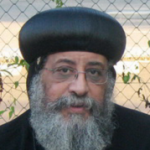
Basil El-Dabh
He received his Bachelors Degree in Pharmacy in 1975 from Alexandria University and earned a fellowship in World Health in England in 1985. Between obtaining his two degrees he began studying at the seminary in 1981, the same year Pope Shenouda III was banished by President Anwar Al-Sadat. Tawadros converted to monasticism in 1988 and was ordained a priest two years later.
He was ordained Bishop Tawadros, General Bishop of Beheira, by Shenouda in 1997. As bishop he gained a reputation for his ability to explain complex theological topics and his work with the youth. He enjoys a close relationship with the Metropolitan of Beheira Bishop Pachomious, locum tenens of the Church until the new pope has been selected.
Bishop Tawadros has expressed his belief that the Church’s role should be pastoral and service-oriented, and not as a political actor. According to Church accounts, Tawadros encourages political progress to come about by Christians’ participation in the political process independent of the Church, which should only intervene in extreme cases.
Father Raphael Ava Mina- Born in December 1942 in the Rod Al-Farag neighbourhood of Cairo as Raphael Sobhy Tawfiq, Father Raphael is the only monk remaining among papal candidates and is the oldest nominee at 70 years old. He obtained his law degree from Cairo University in 1964. He became a monk at the famous Mar Mina Monastery in 1969.
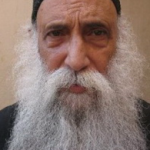
Basil El-Dabh
He was the monastery’s contact to the papacy between the death of its abbot and the appointment of a new one from 1996 to 2003.Father Raphael is well known for the close relationships he maintained with Pope Cyril VI and Pope Shenouda III.
He believes that the Church should remain completely independent of all political life, and that members of the Church should achieve political goals as parts of larger political parties rather than rallying around their religion.



